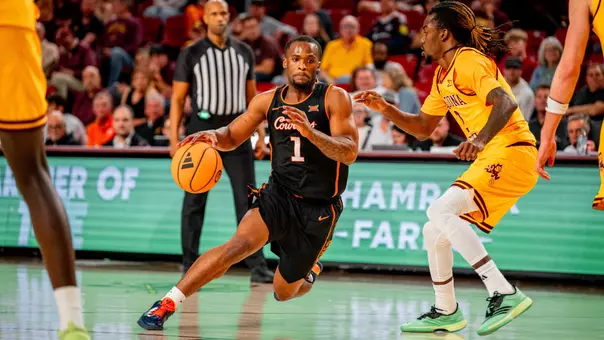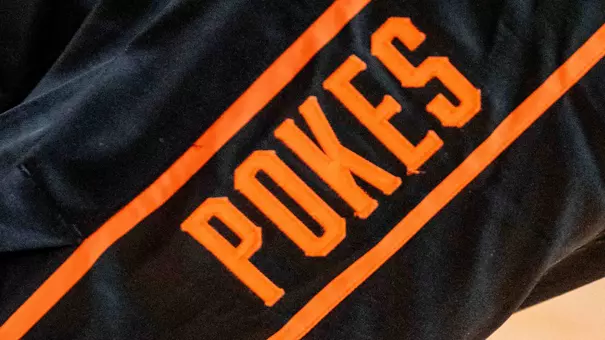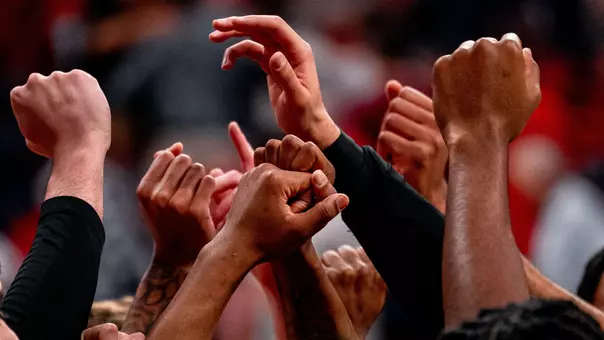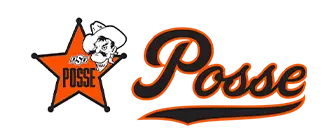Oklahoma State University Athletics
Cowboy Basketball

Travis Ford
- Title:
- Head Coach
Travis Ford was hired to lead the Oklahoma State basketball program on April 17, 2008, and served eight seasons as the head coach. Ford posted a 155-111 overall record and led the Cowboys to five NCAA Tournament appearances.
His 155 wins and .583 win percentage rank third in program history behind only Mr. Henry Iba and Eddie Sutton among all OSU coaches with more than two years of experience.
Ford led the Cowboys to the NCAA Tournament in three of his last four seasons, making OSU one of just 36 programs to make that claim.
In eight seasons under Ford, the Cowboys defeated 21 ranked opponents, including wins over Kansas in each of the last four seasons. An 85-80 victory over top-ranked Kansas in Lawrence on Feb. 2, 2013 was the first-ever road victory over a No. 1 team in school history.
The Cowboys also defeated the top-ranked Jayhawks in 2010, and beat second-ranked Missouri in 2012, both in Gallagher-Iba Arena. The 2010 win over KU was the first by an OSU squad over a No. 1 team since the 1989 season. Ford was just the second coach in school history to defeat both a No. 1 and No. 2 ranked team, joining Mr. Iba.
Ford exceeded all expectations in his first season as the head coach of the Cowboy Basketball program. When OSU led top-seeded Pittsburgh 72-71 in the second round of the 2009 NCAA Tournament, the Cowboys were just four minutes away from a Sweet 16 appearance. It was also Oklahoma State’s first trip to the NCAA Tournament in four seasons, a feat which the Cowboys duplicated in 2010.
The Cowboys went 24-9 in 2012-13, including a 13-5 mark in Big 12 play, just one game away from a share of a Big 12 regular-season title.
In 2014-15, Ford and the Cowboys downed four ranked opponents in a 14 day span - including the No.8 Jayhawks - and advanced to the NCAA Tournament yet again.
OSU had 20 All-Big 12 performers in Ford’s tenure, including two Big 12 Players of the Year in James Anderson (2010) and Marcus Smart (2013) and three Big 12 Freshmen of the Year in Le’Bryan Nash (2012), Smart (2013) and Jawun Evans (2016).
Both Anderson and Smart were also selected in the first round of the NBA Draft. Smart was the No. 6 overall selection in 2014, while Anderson was the 20th overall pick in 2010. Markel Brown joins those two as Cowboys drafted by an NBA team under Ford, selected with the 44th overall pick in 2014.
In the classroom, Oklahoma State has had 17 Academic All-Big 12 performers under Ford’s watch. In 2014, OSU had two Cowboys -- Phil Forte and Christien Sager -- make the Academic All-District team, OSU’s firsts since 2002. In fact, Sager was selected OSU’s Male Scholar Athlete of the Year as a senior.
The Cowboys followed that up in 2015-16 with another pair of Academic All-Big 12 performers in Ford Stuen and Mitchell Solomon.
A tireless worker on the recruiting trail, and has constantly put Oklahoma State in the minds of the nation’s elite prospects. He has coached four McDonald’s All-Americans in his time at OSU, with Evans joining Smart, Nash and Anderson in that elite group.
Ford is able to maximize each and every player’s contribution to the team through his uncanny ability to encourage and motivate. A perfect example of this was convincing former Cowboy Byron Eaton to drop more than 40 pounds between his first meeting with Ford and when the season started just six months later. Eaton shed 42 pounds, going from 248 to 206.
Another instance was when Marshall Moses transformed from essentially a bench warmer during the first semester of his sophomore year to one of the most dominating big men in the Big 12 during conference play. Moses was on the verge of quitting midway through the season as he was averaging just 2.1 points and 1.5 rebounds. However, a sit-down chat with Ford did wonders, propelling Moses to his first-career double-double. Over the second half of that season, Moses started 15 games, averaging 26 minutes, 9.6 points and 8.5 rebounds per contest.
Ford began his head coaching career in 1997 at the age of 27 at Campbellsville University, an NAIA program in Kentucky. After a sub-.500 season in his inaugural year as a head coach, he led the Tigers to a 28-3 record and was named the Mid-South Coach of the Year in 1999. A year later, Campbellsville made its first NAIA National Tournament appearance in nine seasons as the Tigers finished 23-11.
Ford was hired at Eastern Kentucky prior to the 2000-01 season. Despite back-to-back seven-win seasons, he steadily built the Colonels into an Ohio Valley powerhouse, winning 22 games in 2004-05 and taking EKU to its first NCAA Tournament appearance in 26 seasons. After winning the OVC title, the Colonels met seventh-ranked Kentucky in the first round of the 2005 NCAA Tournament in Indianapolis and fell 72-64 to the Wildcats despite cutting the lead to five twice in the final four minutes of the game.
Eastern Kentucky’s 22 victories in 2004-05 are the most for a single season in school history. Matt Witt, the all-time leading scorer in EKU history, played his freshman, sophomore and junior seasons for Coach Ford.
Success led to Ford’s next position as the head coach at Massachusetts. Following John Calipari’s departure, the Minutemen went into a tailspin, going 136-137 over the next nine seasons and winning just 10 games in 2003-04. However, Ford led a resurgence once again, taking UMass from 13-15 in his first season to a 24-9 mark in year two and sharing the Atlantic 10 regular-season championship with a 13-3 league record. UMass picked up its first postseason victory in over a decade when the Minutemen defeated Alabama 89-87 in the first round of the NIT.
In 2007-08, Ford and the Minutemen won 25 games, including an 82-71 win over 14th-ranked Dayton on the road. The win over Dayton propelled the Minutemen into the top 20 of the ratings percentage index. UMass also had a 107-100 victory at Syracuse and an 83-80 win at Boston College. UMass peaked at No. 9 in the RPI during the season before settling in the No. 33 spot at season’s end.
The 25-11 record was good enough for a No. 2 seed in the National Invitation Tournament. UMass defeated the Orange for a second time in the Carrier Dome -- the first team in history to do so in the same season -- rallying back from a 22-point deficit for an impressive 81-77 win in the NIT.
Massachusetts met two-time defending national champion and No. 1 seed Florida in the NIT semifinals in Madison Square Garden in New York City and came away with an impressive 78-66 victory over the Gators. UMass fell in the finals to Ohio State, 92-85.
The Minutemen finished the season ranked eighth nationally in scoring offense, averaging 81.5 points per game. UMass ranked third nationally in blocks per game, averaging 7.3 per contest. The Minutemen also averaged 9.2 three-pointers made per game, ranking 13th nationally.
Ford coached back-to-back Atlantic 10 Players of the Year as Stephane Lasme won the award in 2006-07 and Gary Forbes received the accolade in 2007-08. In fact, he has coached the conference player of the year in four of his last eight seasons of coaching as James Anderson was named the Big 12 Player of the Year in 2009-10 and Smart was awarded that accolade in 2012-13.
Ford began his career in the collegiate ranks as a freshman at Missouri in 1989. He was named to the UPI Big Eight all-freshman team after averaging 6.4 points and 3.5 assists per game. He transferred to Kentucky the following season and led the Wildcats to the NCAA Tournament three times.
Ford was named first-team All-SEC in 1993 and second-team all-league in 1994. He was also a two-time Most Valuable Player at the SEC Tournament in 1993 and `94. He was named the Southeast Region MVP as he led Kentucky to the Final Four in 1993 as a junior.
Ford owned the Wildcat record for assists in a game with 15 against -- ironically, Eastern Kentucky. He also ranks second on the single-season assists list with 193 during his senior season. His 428 assists in a three-year career rank ninth all-time in the UK record books.
An outstanding shooter as well, Ford held the Wildcat record for three-pointers made in a season for 16 years when he made 101 during his junior year. That season, he shot a school-record 52.9 percent from beyond the arc. His 44.5 career three-point percentage ranks as the best in school history among players with at least 200 attempts.
He ranks second in UK history in single-season (91.2 percent) and third in career (88.2) free-throw percentage. At one time, Ford connected on 50 consecutive free throws, a school record.
A leader both on the court and off, Ford received Academic All-SEC honors as a sophomore, junior and senior. During his first year at Kentucky, he was named the team’s Student-Athlete of the Year.
The Madisonville, Ky., native was part of the gold medal winning South squad at the 1990 U.S. Olympic Festival and later played for the U.S. team that won a gold medal at the 1993 World University Games.
Ford’s prep playing career was also stellar. He led his team to three state tournament appearances during his career at North Hopkins High School and was named All-State. He averaged 31.7 points per game as a senior and was twice named Western Kentucky Player of the Year.
Ford’s playing days ended in training camp with the Golden State Warriors, but his time in California landed him the role of Danny O’Grady in the movie, “The Sixth Man”.
Born Dec. 29, 1969, Travis and his wife, Heather, have three children: Brooks, Kyleigh and Shane. Heather was a swimmer for the Kentucky Wildcats. Ford earned his Bachelor of Science degree in communications from the University of Kentucky in 1994.
His 155 wins and .583 win percentage rank third in program history behind only Mr. Henry Iba and Eddie Sutton among all OSU coaches with more than two years of experience.
Ford led the Cowboys to the NCAA Tournament in three of his last four seasons, making OSU one of just 36 programs to make that claim.
In eight seasons under Ford, the Cowboys defeated 21 ranked opponents, including wins over Kansas in each of the last four seasons. An 85-80 victory over top-ranked Kansas in Lawrence on Feb. 2, 2013 was the first-ever road victory over a No. 1 team in school history.
The Cowboys also defeated the top-ranked Jayhawks in 2010, and beat second-ranked Missouri in 2012, both in Gallagher-Iba Arena. The 2010 win over KU was the first by an OSU squad over a No. 1 team since the 1989 season. Ford was just the second coach in school history to defeat both a No. 1 and No. 2 ranked team, joining Mr. Iba.
Ford exceeded all expectations in his first season as the head coach of the Cowboy Basketball program. When OSU led top-seeded Pittsburgh 72-71 in the second round of the 2009 NCAA Tournament, the Cowboys were just four minutes away from a Sweet 16 appearance. It was also Oklahoma State’s first trip to the NCAA Tournament in four seasons, a feat which the Cowboys duplicated in 2010.
The Cowboys went 24-9 in 2012-13, including a 13-5 mark in Big 12 play, just one game away from a share of a Big 12 regular-season title.
In 2014-15, Ford and the Cowboys downed four ranked opponents in a 14 day span - including the No.8 Jayhawks - and advanced to the NCAA Tournament yet again.
OSU had 20 All-Big 12 performers in Ford’s tenure, including two Big 12 Players of the Year in James Anderson (2010) and Marcus Smart (2013) and three Big 12 Freshmen of the Year in Le’Bryan Nash (2012), Smart (2013) and Jawun Evans (2016).
Both Anderson and Smart were also selected in the first round of the NBA Draft. Smart was the No. 6 overall selection in 2014, while Anderson was the 20th overall pick in 2010. Markel Brown joins those two as Cowboys drafted by an NBA team under Ford, selected with the 44th overall pick in 2014.
In the classroom, Oklahoma State has had 17 Academic All-Big 12 performers under Ford’s watch. In 2014, OSU had two Cowboys -- Phil Forte and Christien Sager -- make the Academic All-District team, OSU’s firsts since 2002. In fact, Sager was selected OSU’s Male Scholar Athlete of the Year as a senior.
The Cowboys followed that up in 2015-16 with another pair of Academic All-Big 12 performers in Ford Stuen and Mitchell Solomon.
A tireless worker on the recruiting trail, and has constantly put Oklahoma State in the minds of the nation’s elite prospects. He has coached four McDonald’s All-Americans in his time at OSU, with Evans joining Smart, Nash and Anderson in that elite group.
Ford is able to maximize each and every player’s contribution to the team through his uncanny ability to encourage and motivate. A perfect example of this was convincing former Cowboy Byron Eaton to drop more than 40 pounds between his first meeting with Ford and when the season started just six months later. Eaton shed 42 pounds, going from 248 to 206.
Another instance was when Marshall Moses transformed from essentially a bench warmer during the first semester of his sophomore year to one of the most dominating big men in the Big 12 during conference play. Moses was on the verge of quitting midway through the season as he was averaging just 2.1 points and 1.5 rebounds. However, a sit-down chat with Ford did wonders, propelling Moses to his first-career double-double. Over the second half of that season, Moses started 15 games, averaging 26 minutes, 9.6 points and 8.5 rebounds per contest.
Ford began his head coaching career in 1997 at the age of 27 at Campbellsville University, an NAIA program in Kentucky. After a sub-.500 season in his inaugural year as a head coach, he led the Tigers to a 28-3 record and was named the Mid-South Coach of the Year in 1999. A year later, Campbellsville made its first NAIA National Tournament appearance in nine seasons as the Tigers finished 23-11.
Ford was hired at Eastern Kentucky prior to the 2000-01 season. Despite back-to-back seven-win seasons, he steadily built the Colonels into an Ohio Valley powerhouse, winning 22 games in 2004-05 and taking EKU to its first NCAA Tournament appearance in 26 seasons. After winning the OVC title, the Colonels met seventh-ranked Kentucky in the first round of the 2005 NCAA Tournament in Indianapolis and fell 72-64 to the Wildcats despite cutting the lead to five twice in the final four minutes of the game.
Eastern Kentucky’s 22 victories in 2004-05 are the most for a single season in school history. Matt Witt, the all-time leading scorer in EKU history, played his freshman, sophomore and junior seasons for Coach Ford.
Success led to Ford’s next position as the head coach at Massachusetts. Following John Calipari’s departure, the Minutemen went into a tailspin, going 136-137 over the next nine seasons and winning just 10 games in 2003-04. However, Ford led a resurgence once again, taking UMass from 13-15 in his first season to a 24-9 mark in year two and sharing the Atlantic 10 regular-season championship with a 13-3 league record. UMass picked up its first postseason victory in over a decade when the Minutemen defeated Alabama 89-87 in the first round of the NIT.
In 2007-08, Ford and the Minutemen won 25 games, including an 82-71 win over 14th-ranked Dayton on the road. The win over Dayton propelled the Minutemen into the top 20 of the ratings percentage index. UMass also had a 107-100 victory at Syracuse and an 83-80 win at Boston College. UMass peaked at No. 9 in the RPI during the season before settling in the No. 33 spot at season’s end.
The 25-11 record was good enough for a No. 2 seed in the National Invitation Tournament. UMass defeated the Orange for a second time in the Carrier Dome -- the first team in history to do so in the same season -- rallying back from a 22-point deficit for an impressive 81-77 win in the NIT.
Massachusetts met two-time defending national champion and No. 1 seed Florida in the NIT semifinals in Madison Square Garden in New York City and came away with an impressive 78-66 victory over the Gators. UMass fell in the finals to Ohio State, 92-85.
The Minutemen finished the season ranked eighth nationally in scoring offense, averaging 81.5 points per game. UMass ranked third nationally in blocks per game, averaging 7.3 per contest. The Minutemen also averaged 9.2 three-pointers made per game, ranking 13th nationally.
Ford coached back-to-back Atlantic 10 Players of the Year as Stephane Lasme won the award in 2006-07 and Gary Forbes received the accolade in 2007-08. In fact, he has coached the conference player of the year in four of his last eight seasons of coaching as James Anderson was named the Big 12 Player of the Year in 2009-10 and Smart was awarded that accolade in 2012-13.
Ford began his career in the collegiate ranks as a freshman at Missouri in 1989. He was named to the UPI Big Eight all-freshman team after averaging 6.4 points and 3.5 assists per game. He transferred to Kentucky the following season and led the Wildcats to the NCAA Tournament three times.
Ford was named first-team All-SEC in 1993 and second-team all-league in 1994. He was also a two-time Most Valuable Player at the SEC Tournament in 1993 and `94. He was named the Southeast Region MVP as he led Kentucky to the Final Four in 1993 as a junior.
Ford owned the Wildcat record for assists in a game with 15 against -- ironically, Eastern Kentucky. He also ranks second on the single-season assists list with 193 during his senior season. His 428 assists in a three-year career rank ninth all-time in the UK record books.
An outstanding shooter as well, Ford held the Wildcat record for three-pointers made in a season for 16 years when he made 101 during his junior year. That season, he shot a school-record 52.9 percent from beyond the arc. His 44.5 career three-point percentage ranks as the best in school history among players with at least 200 attempts.
He ranks second in UK history in single-season (91.2 percent) and third in career (88.2) free-throw percentage. At one time, Ford connected on 50 consecutive free throws, a school record.
A leader both on the court and off, Ford received Academic All-SEC honors as a sophomore, junior and senior. During his first year at Kentucky, he was named the team’s Student-Athlete of the Year.
The Madisonville, Ky., native was part of the gold medal winning South squad at the 1990 U.S. Olympic Festival and later played for the U.S. team that won a gold medal at the 1993 World University Games.
Ford’s prep playing career was also stellar. He led his team to three state tournament appearances during his career at North Hopkins High School and was named All-State. He averaged 31.7 points per game as a senior and was twice named Western Kentucky Player of the Year.
Ford’s playing days ended in training camp with the Golden State Warriors, but his time in California landed him the role of Danny O’Grady in the movie, “The Sixth Man”.
Born Dec. 29, 1969, Travis and his wife, Heather, have three children: Brooks, Kyleigh and Shane. Heather was a swimmer for the Kentucky Wildcats. Ford earned his Bachelor of Science degree in communications from the University of Kentucky in 1994.













